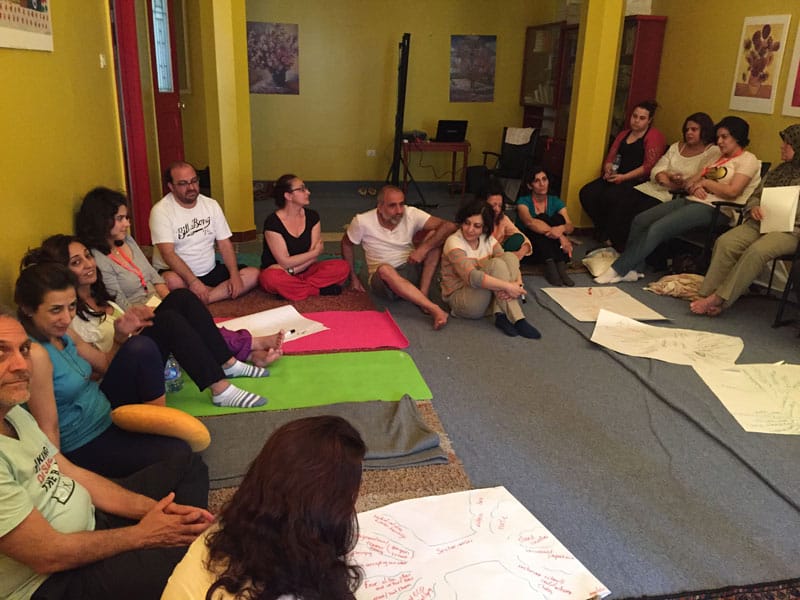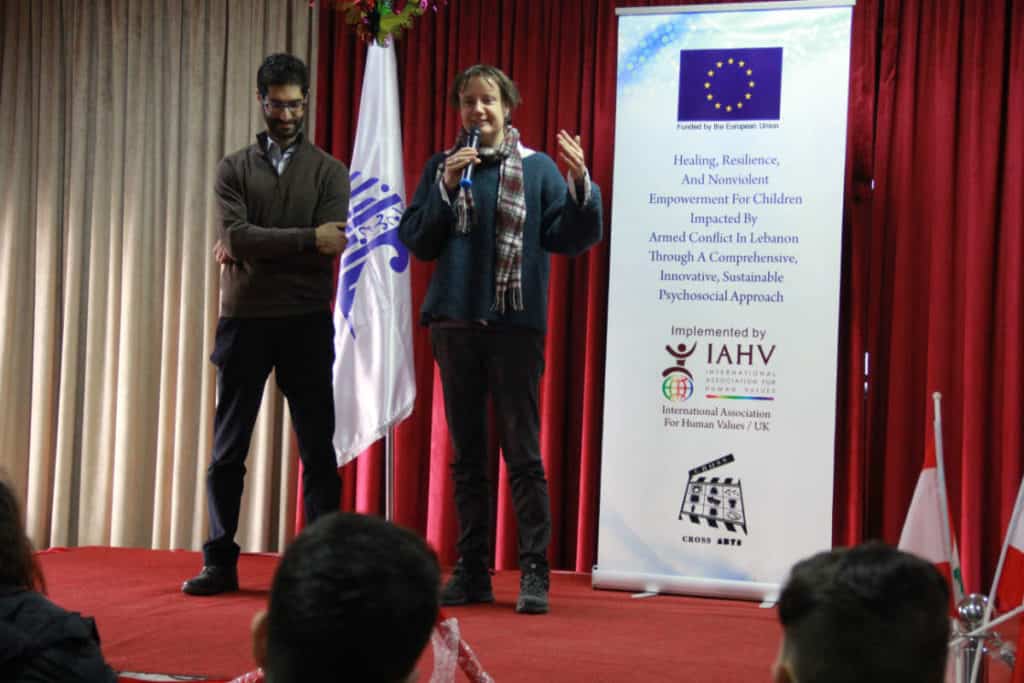Next upcoming training: Autumn 2023


What you will learn
The benefits of the techniques taught in the training are immediate and deepen over time with continued personal / group practice. Several independent studies on the numerous mental and physical health benefits of the training, such as reducing cortisol and alleviating depression, anxiety and PTSD, have been published in international peer-reviewed journals. (www.aolresearch.org)
“We are offering psycho social support programs, but we have never done an analysis like this to understand what are actually the psycho social factors we need to work with. Now I know why I see that look of unsatisfaction in the eyes of the refugees I work with: my program and approach lack their wellbeing! Thank you for teaching us a new perspective of peacebuilding.” Syrian refugee camp coordinator, Tripoli, Lebanon
“I think this will address the roots of conflict, the psychological dimension that nobody deals with or comes close to. This is an effective group approach for psycho-social issues. I felt the effect of the techniques for myself on many levels and I think it would be very practical to extend it to my social environment and work since it is a real need. We need to introduce now effective techniques to dissolve tension between many people.” Sanaa, Social worker, Beirut
“You are more specialised than any of the agencies providing psycho-social support.”Youth worker, Tripoli, Lebanon
“Our words and how we behave as peaceworkers are the equivalent in our field to a surgeon’s hand when doing surgery. Just as the slightest shake or mistake in surgery can cause harm, we also need to be intimately aware of how our words and behaviour are understood and perceived, and to ourselves model and manifest the values and practice we’re promoting.”
Kai Brand-Jacobsen, Director of the Department of Peace Operations (DPO) and Global Peacebuilding Adviser to IAHV
For Whom?
IAHV trainings have benefited UN personnel, World Bank Management cadres, European officials, staff of international and national NGOs, university students and many more. IAHV Peacebuilding’s approach to integrated peacebuilding has been heralded by experienced practitioners and organisations as addressing a key need to improve health and well being in how peacebuilding is done, and in the quality, impact and effectiveness of peacebuilding, development and humanitarian aid.
“This program helped me in finding one of the most important keys to achieve my psychological, mental and physical health. As a psychotherapist I will be more effective and concentrating in my sessions with the patients and as a trainer for teenagers and adults I will be more focused and calm in conveying to them my believe in the importance of peace.” Lubna, psychologist from Syria, Beirut
“The subject of the workshop is highly important, not only for our beneficiaries, who are refugees and vulnerable persons, but also for all the social workers, because they are in daily contact with refugee and host community problems, so they are absorbing negative energy from them. These kind of workshop can help us as social workers to get rid of the stress which we are exposed to during work and give us the opportunity to work better.” Zeina, Amel Center Manager, Haret Hreik, Lebanon
Needs in Peacebuilding Training, Programs and Policy
- Peacebuilding practitioners are often working under extremely challenging conditions, which often lead to stress, tension and reduced productivity, but also to burn-out, depression or substance abuse. The impact this has upon the quality of our work as peacebuilders is often underestimated. Rarely have we been trained or educated in practical stress and self-management toolsto effectively handle this aspect of peacebuilding work.
- Practitioners lack of proper exposure and training on how to address deep-rooted and complex psycho-social aspects often means they are neglected in peacebuilding programmes. Through a personal experience this training offers participants insight and confidence to handle crucial psycho- social factors in an effective way to make a meaningful impact on conflict and peace dynamics.
Current peacebuilding efforts focus extensively on external conditions and systems, while often failing to address a crucial dimension of peacebuilding. Namely: creating peace in the minds, hearts and attitudes of peopleAnger, frustration, hate, depression, pain, and intolerance are key dimensions in many conflicts. Failure to comprehend or effectively address these powerful driving forces erodes the effectiveness of many efforts of mainstream peacebuilding. Few organisations actually implement effective psycho-social interventions on a scale significant enough to have an impact on conflict and peace dynamics. Working proficiently with psycho-social aspects of peacebuilding entails the promise of a strong psycho-social foundation for peace and increased impact of peacebuilding efforts on the ground.
- The quality and impact of our work is to a great extent defined by who we are as “peacebuilders” and how we engage with communities and the people we work and interact with on the ground. This training nurtures and strengthens on a deeper level those core aspects within ourselves that support the development of peacebuilding qualities and skills essential for transformative and effective practice, including: active listening, compassion and empathy, holding multiple realities, patience and endurance, balancing simplicity and complexity, facilitation, tranquility, discernment and integrity. As such, IAHV’s training provides present and future peacebuilders in a short time frame with the insight and practical tools to develop one’s full potential as a peacebuilder, both as a human being and a professional.
Through this training IAHV hopes to contribute enriching and strengthening the peacebuilding field as a whole.



Training Content
IAHV’s Training Program Towards Integrated Peacebuilding is a bespoke program created to provide professional peacebuilders and peacebuilding organizations with the wellbeing, knowledge and skills to improve and integrate psychosocial skills and self-care into their peacebuilding work.
This training consists of 3 components:
1. Resilience, Stress Management and Self-Care
Resilience, Stress management and Self-care draws upon proven and scientifically validated techniques to assist people working in difficult, challenging and often traumatic contexts to deal effectively with emotional and physical stresses. The central focus here is on ensuring health and well-being for peaceworkers and partners in the field, improving awareness of how our environment and context can affect our ability to engage proficiently in peace work, as well as concrete techniques and methods to assist us in dealing with stress and other emotional barriers - integrating psycho-social health and well-being and personal resilience and stress management into effective peace work.
- Learn a personal self-care program with effective techniques to strengthen resilience, wellbeing and stress management (including the SKY technique, proven to improve health, immunity, sleep and reduce anxiety, depression, burn-out)
2. Professional Skills Training: Psychosocial Peacebuilding Project Design
Providing tools for analysis, design and delivery of psychosocial interventions to increase sustainability and effectiveness of peacebuilding outcomes.
3. Developing one’s Human Potential as a Peacebuilder: Peacebuilding Skills
Overview and in-depth examination of psychosocial frameworks of analysis and specific factors.
This program has been designed by experienced practitioners and peace workers for practitioners in the field to address a critical component of effective peacebuilding far too often overlooked. The integration of a strong personal experiential component with professional skills training to improve peacebuilding practice makes this a uniquely powerful program.
Trainer: Dr. Katrien Hertog

Dr. Katrien Hertog is a peacebuilding researcher, trainer and practitioner with 20 years of experience in the academic and non-governmental sector.
In her capacity as Director Peacebuilding Programs for IAHV, as well as a researcher, she has been pioneering the practice of psychosocial peacebuilding (PSPB) for more impactful peacebuilding practice and advocating for its integration in international peacebuilding policy and practice. She develops, implements and advocates for PSPB programs on preventing and transforming violent extremism, trauma relief to break the cycles of violence, strengthening mediation and reconciliation processes, and training peacebuilding personnel.
Dr. Hertog has a MA in Peace Studies from the University of Bradford and a PhD from the Centre for Peace Research at the University of Leuven.
Practical Information
October - November 2022 (Online):
Part 1: Self-Care and Peacebuilding Skills (Module 1)
- Timings:
- Friday 28 October, 1800 – 2100 CET
- Saturday 29, Sunday 30 October: 10.00 – 13.00 CET
- Registration Deadline: 14 October 2022
Part 2: Self-Care, Peacebuilding Skills and Psychosocial Peacebuilding Project Design (Module 1, 2 & 3)
- Timings:
- Wednesday 2 and 9 Nov, 1800 – 2100 CET
- Saturday 5 and 12 Nov: 10.00 – 13.00 CET
- Registration Deadline: 14 October 2022
November 2022, Armenia:
- Timings:
- In-person: 21 - 25 November 9.00-13.00 (5 days)
+ Online: 29 November + 1 December 1600-1900
- In-person: 21 - 25 November 9.00-13.00 (5 days)
- Registration Deadline: 7 November 2022
Scholarships available for Armenia training from Women Fund Armenia
Price: 580 euro (Part 1 + 2)
Please note:
- Part 1 & Part 2 are ONE Training.
- Part 1 is a prerequisite to enroll in Part 2. The techniques learnt in Part 1 will be repeated throughout Part 2.
- It is also possible to attend only Part 1 for those only interested in self-care. (price 300 euro)
Our trainings are conducted online through Zoom and include live sessions, individual exercises and group activities.
Each training is tailored to the needs of the organisation / participants / specific peacebuilding program, and can also be organized and tailored on request.
Advanced next step trainings and follow up support and customised assistance are available.
“This was very enriching, hopeful and encouraging – according to me an enormous potential for our society! This seems very applicable for many youth and children, not just radicalized, but also victims of child prostitution, youth who are lost and estranged from themselves, as well as for youth workers to increase their capacity to deal with stressful situations.”
Youth Lawyer in Antwerp
Clients and Partners of IAHV’s Professional and Personal Care Programs
ICCS, IRD, Save the Children, Handicap International, NRC, World Vision, UNRWA, Relief International, Jordan River Foundation, Madrasati, Insani, Jesuit Refugee Services, Australian Embassy, SOS Children's Village, Progressive Women Union, Fedasil

